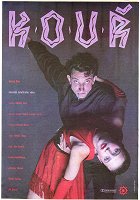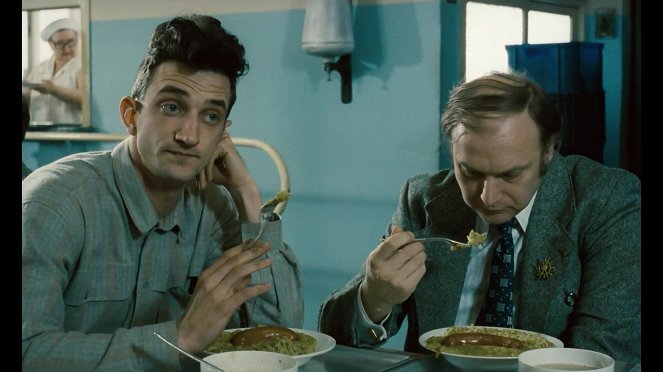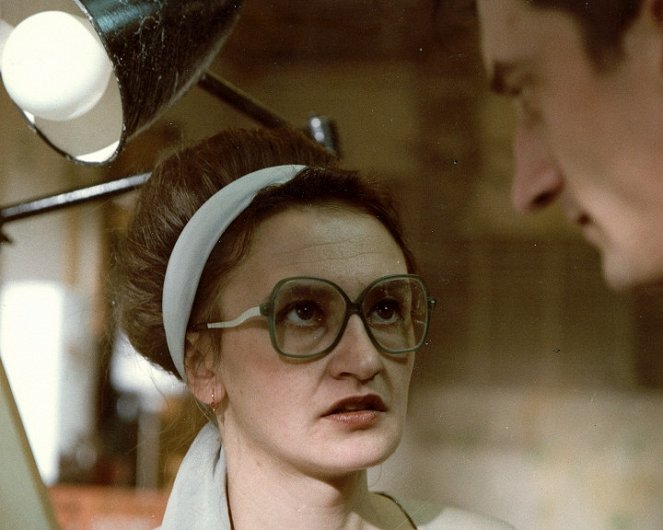Réalisation:
Tomáš Vorel st.Scénario:
Tomáš Vorel st.Photographie:
Martin DubaMusique:
Michal VíchActeurs·trices:
Jan Slovák, Lucie Zedníčková, Eva Holubová, David Vávra, Jaroslav Dušek, Petr Čtvrtníček, Šimon Caban, Aleš Najbrt, Radomil Uhlíř, Jiří Fero Burda (plus)Résumés(1)
Tomáš Vorel's second feature film – in the genre of a “rhythmical” - returns to the era of the fading totalitarian decay. A young and observant engineer (Jan Slovák) gets a job in a factory ruled by a Brezhnevian director. He encounters a set of notorious slackers, scheming climbers and flunkies of the regime. In the shabby environment, foggy with smoke from the factory chimneys as well as cigarettes, he witnesses malicious schemes, senseless disco partying, but also rebellious defiance. To complete this sarcastic freak show, Šimon Caban plays a dashing DJ. Epilogue, describing the Velvet Revolution, foretells the quick change of attitudes that followed the regime's fall. (Febiofest)
(plus)Vidéo (1)
Critiques (6)
Relevons nos manches quand les roues s'arrêtent,
Hey tipule, holahé!
La logique poussée à l'absurde de l'époque industrielle, grâce à l'ossification sous la forme d'un régime autoritaire qui n'a pas réussi à se distinguer de l'époque dans laquelle il est né et s'est développé, et par conséquent n'a pas réussi à préserver avec lui-même cette machinerie industrielle, ne fait que retarder le moment où tout le monde réalisera que les roues se sont réellement arrêtées. À ce moment-là, une nouvelle génération vient faire tourner de nouvelles roues stellaires: contre les traverses en acier inflexibles, la fumée des cheminées et des cigarettes, les acides dans les tuyaux et l'alcool dans le sang, une nouvelle génération arrive: flexible, souple, dans la colonne vertébrale comme dans les jambes, danseurs de disco qui boivent du Coca-Cola et pensent à l'écologie. D'un côté, la logique absurde du passé, de l'autre, un avenir encore incertain qui ne promet pas de lendemains meilleurs, et entre les deux: une autre absurdité comme une charnière, divisant deux arbres de transmission qui finissent par s'engrener et le monde continue dans la continuité, simplement à un niveau différent. Ainsi, l'avenir ne semble pas aussi sombre, il sert surtout d'analyse comédio-analytique brillante de l'époque révolue, eh bien, nous ne sommes jamais les maîtres de notre œuvre, à laquelle on attribue toujours un sens légèrement différent après coup, mais même là, il y a quelque chose d'instructif: dans la victoire enivrante du big beat sur le disque de normalisation, quand dans les années 90, on semblait que la liberté avait déjà gagné, les héros de la Fumée ont en fait encore un pied dans le temps vaincu: cigarettes, alcool, forteresse... L'avenir appartient à d'autres, parce que l'histoire préfère toujours les mêmes valeurs, même si elle change de façade: donc l'histoire continue de rouler toujours avec toi, nous savons où mènent les routes - vers nos discothèques, trempant dans du lait de soja, et désormais se développant de manière durable (surtout, tant qu'ils sont toujours à bord), conscients, DJ de notre époque à venir.
()
I read somewhere that we don't have a film to balance with normalization. What about Smoke? This unique "musical", which, in the condensed environment of one industrial complex, offers reflection of almost all the essential components of totalitarianism! It is a pity that this Vorel film fit in so well, because among the flood of demented capitalist satires, it was a well-done project in every way, which easily processed normalizing morality and aesthetics and effectively transferred the poetics of the Sklep theatre into film life. At the same time, Vorel, with a penetration so typical of the masters of sarcasm, revealed the then almost neglected tones of false theatre in enthusiastic velvet-revolutionary code and incorporated them into the script during filming. One cannot overlook the clairvoyance of the film finale, in which the old mixes with the new according to a strangely harmonious script, and the swine suddenly put on masks with a human face. The revived air of the factory still carries a strong smell of totalitarian smoke. An unpleasantly far-sighted vision of the future. I'm sorry, but compared to Smoke, Pupendo's message feels like a cheap band of humor for the whole family. A film that should not be forgotten. A film that should be REMEMBERED!
()
A rhythmical that became the testimony of a generation. Today, in retrospect, it is clear that one current was replaced only by sobering up, and just as the heroes of Smoke struggle with their demons, the hero of The Stone Bridge fell into a much more severe depression, and Vorel thus copied the less popular side of the development of Czech society at the turn of the 1980s and 1990s. He was not caressing, but rather just commenting on the condition in which he himself was living.
()
Given the frequency of its appearance on TV, this film is a bit of forgotten normalization satire. It goes about its work cleverly via wacky slapstick in which all the screws are tightened to the max with such vigor that it gives you the chills. Perhaps too much. I’ll give it a full review after watching it again, which I am not opposed to given the number of killer catchphrases.
()
As someone who has been watching Smoke every week for years, I can't hide my excitement at the fresh remaster, which reveals not only various additional details in the already complicated mise-en-scene, but also new story plans. Smoke is nowadays almost exhausting to watch with how much is going on in each scene and on so many levels (and yet it's fucking hilarious the whole time). I hope after its well-deserved revamping that Smoke finally makes it out into the world, because applying this distinctive allegory with its unique genius loci to a foreign audience could be quite entertaining.
()



Annonces